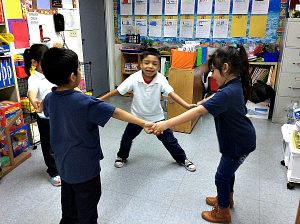Sometimes you have to slow down to keep your momentum, especially toward the end of the school year when short-term priorities have the potential to distract from long-term goals.
Last month, ECE coaches Ana Rosas (Avenal ES) and Brenda Selva (King ES) explored the topic of sustaining instructional change at the annual conference for the California Association on the Education of Young Children. In the week following the conference, the pair identified several strategies to help their grade-level teams slow down, recharge and refocus.

Explore and affirm your shared values.
Differences of opinion are inevitable when you’re working with a team, but chances are you and your colleagues have much in common. Talk openly, honestly and regularly about the values that drove you to the teaching profession. Validate each other’s differences by articulating how everyone’s unique values contribute to student success. Affirm the values you share by posting them, reviewing them often, and basing your shared decisions on them.
Agree to be beginners together.
According to a report from the Center for Public Education called Teaching the Teachers, it can take “as many as 50 hours of instruction, practice and coaching before a new teaching strategy is mastered and implemented in class.” Considering the serious investment of time required to institute instructional change—particularly complex change, like integrating the arts—grade-level teams should adopt a healthy attitude about the inevitable difficulties they’ll face together. Starting small, playing with different approaches, teaching lessons together, and creating safe spaces for idea-sharing and experimentation are critical to a team’s growth.
Attend to socio-emotional needs.
Change—even good change—causes stress. Professional learning communities should discuss how they will manage stress well before it impedes progress. Making art together, practicing mindfulness together, setting time aside for regular reflection and celebration … all of these strategies can help teams safeguard each other’s well-being so that they can take care of business efficiently when they need to.
Strong teams set and pursue goals together, but success always comes in fits and starts. That’s why it’s important to slow down periodically, take stock and regroup. Plan these pauses. Celebrate them. They just might help you deepen your understanding of the progress you’ve made or clarify the future you envision.
